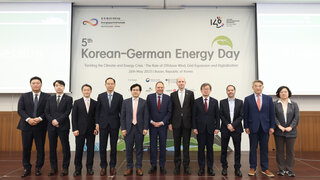5th Korean-German Energy Day

The 5th Korean-German Energy Day (KGED) took place on Friday, May 26, 2023, on behalf of the German Federal Ministry of Economic Affairs and Climate Action (BMWK) and the Korean Ministry of Trade, Industry and Energy (MOTIE) as a conference in Busan, Korea and was organized by the Korean-German Chamber of Commerce and Industry (KGCCI) and adelphi and supported by the Korea Energy Economic Institute (KEEI) and the Korea Institute of Energy Technology Evaluation and Planning (KETEP). The 5th Korean-Germany Energy Day focused on how to simultaneously address the climate and energy crisis with a focus on the role of offshore wind, grid expansion and digitization. Over the course of three sessions, experts shared their knowledge and experience with more than 130 participants from politics, business and academia.
After keynote speeches by Mr. Young-ghil Cheon, Deputy Minister for Energy Industry Office from the Ministry of Trade, Industry and Energy (MOTIE) and Mr. Peter Winkler, Deputy Head of Mission from the German embassy where both stressed the benefits of bilateral cooperation to respond to climate change, Mr. Minsoo Kim, Vice President of Korea Southner Power, Mr. SungHo Hong, Country Managing Director of Siemens Energy Korea & Siemens Gamesa Renewable Energy Korea, shared their perspectives on the future of energy.
In the panel discussion on “Climate crisis and energysecurity: reconciling two distinct challenges”, the panelists agreed that more flexibility in energy systems and less dependence on fossil fuel imports can enhance energy security. Thus, it is advisable to enhance storage systems, grids and demand response as well as to diversify imports and build up renewable energies.
The second session focused on offshorewind expansion and the role of grids. After a presentation on the renewable energy potential in Korea and Germany, experts presented insights into the status and future of offshore wind development in each country. While Germany currently has an almost 40 times larger offshore wind capacity than Korea, the untapped potential for offshore wind energy in Korea is very high. In the panel discussion experts shared their view on how to scale up offshore wind power swiftly in Korea, how a new permitting system would be beneficial and what can be learned from Germany’s history with grid expansion.
The third session dealt with the digitization of the energy transition and smartgrids. In presentations and a panel discussion the role of regulation, digitization and innovation for grids were elaborated. Moreover, the experts shared and discussed their experience and knowledge of new business models in light of the different conditions in the two countries. It was underlined that regulators must facilitate research and innovation and support the roll-out of technologies such as the smart meter.
Yet again, it became clear that Germany and Korea can learn a lot from each other on their way to climate neutrality. International cooperation and mutual support can contribute to achieving the respective climate goals and at the same time make the societies and economies of both countries more resilient to future challenges. Overall, the event provided an excellent platform for energy experts from government, industry, research and civil society to exchange ideas, engage in dialogue, network in face-to-face meetings and learn from each other's experiences.
Please find the detailed report here.